#credit restoration agency
Explore tagged Tumblr posts
Text

In the realm of personal finance, few topics generate as much confusion and misconception as the credit score. As a pivotal measure of financial health, your credit score influences everything from loan approvals to interest rates. Yet, despite its significance, myths surrounding credit scores abound, leading to misinformation and poor financial decisions. This blog post seeks to debunk common myths and provide clarity on this essential financial tool.
#credit restoration#credit score#credit card#credit restoration services#credit report#bad credit#credit restoration agency
0 notes
Text
I want an origins remake/remaster so bad it's not even funny
#river rambles#dragon age#problem with that despite a lot of my faith being somewhat restored in bioware im still not sure if they could pull it off#in a way that's both faithful but also works gameplay wise#like listen. if they did- which is unlikely in the first place because dao and da2 are a whole different universe than dai and dav#and dark fantasy is harder to sell under ea i guess;#BUT IF THEY DID- they'd have to figure out a way to translate the specializations. even the ones that they pretend don't exist later on#(cough ranger cough)#and plot wise. I have to be honest I still dont trust them to be faithful#ESPECIALLY after that post credits achievement scene 😭😭->-> SPOILERS FOR IT#i don´t know that the fuck the executioners?? are meant to be but what I got is 'ah ok so to set up the next big bad let's just-#rip the agency away from some of the original- human villains to set them up as the evils pulling the strings- NOOOOOO#NOOOOOOOOOOOOOOOOOOOOOOOOO BUDDY#take it back or so help me#and like if they were to remake the ogs i really dont think they WOULD do it faithfully bc they'd prioritize the story fitting together#even if it makes the whole thing worse as a result#AAAAAAAAAAAAAAAAAAAAAA#anyway
3 notes
·
View notes
Text
Website : http://www.sungroupfinancial.com/
Address : 5801 N Ann Arbor Ave, Oklahoma City, OK 73122
Phone : +1 833-843-5979
SUN GROUP FINANCIAL is the "highly esteemed" leading authority among financial institutions in the mortgage industry. As an in-house lender, all the loan advisors, underwriters, and processors are based in one location working together to secure a loan for you and your family. We have a credit restoration program, that will increase your credit score quickly and easily to get the best rate in this current market. With over 25 years experience and dedication to our clients, SUN GROUP FINANCIAL will continue to serve families with their credit, financial, and real estate needs when others say "NO".
Yelp : https://www.yelp.com/biz/sun-group-financial-no-title
#Mortgage loan#Loan agency#credit restoration#financial service near me#Mortgage loan near me#Loan agency near me#financial service in Oklahoma city#Mortgage loan in Oklahoma city#Loan agency in Oklahoma city
1 note
·
View note
Text
President Donald Trump’s “government efficiency” cheerleader Elon Musk proposed simply ignoring all federal regulations during a public call shortly after midnight Monday morning.
Musk, whose newly formed “Department of Government Efficiency” team has in recent days executed a dramatic power grab at several government agencies, called for “wholesale removal of regulations.”
The public call was hosted on his website X, formerly Twitter, and included two senators and the Trump ally Vivek Ramaswamy.
“Regulations, basically, should be default gone,” Musk said. “Not default there, default gone. And if it turns out that we missed the mark on a regulation, we can always add it back in.”
“These regulations are added willy-nilly all the time. So we’ve just got to do a wholesale, spring cleaning of regulation and get the government off the backs of everyday Americans so people can get things done,” Musk said, adding later: “If the government has millions of regulations holding everyone back, well, it’s not freedom. We’ve got to restore freedom.”
Later, Ramaswamy — who briefly co-led Musk’s White House DOGE project — said, “I think it’s possible now, it’s actually possible” thanks to Trump’s second term and a conservative-dominated Supreme Court.
Musk replied, “If it’s not possible now, it’ll never be possible. This is our shot. This is the best hand of cards we’re ever going to have. And if we don’t take advantage of this best hand of cards, it’s never going to happen, so we’re going to do it.”
“Now or never,” Sen. Joni Ernst (R-Iowa) and Ramaswamy agreed. Sen. Mike Lee (R-Utah) also spoke on the call.
Federal regulations, which are enforced by the executive branch agencies, govern everything from pollutants to construction safety to banking requirements. Musk, the world’s wealthiest man and a key player in several industries, would benefit immensely from the ability to pick and choose which regulations to follow.
Musk on the call also appeared to claim credit for the shutdown of the U.S. Agency for International Development, the U.S.-funded aid agency that oversees humanitarian projects around the world, calling it a corrupt “ball of worms.” Shortly after the call, he wrote on X that “We spent the weekend feeding USAID into the wood chipper.”
He said on the call that “we’re shutting it down” and that Trump “agreed that we should shut it down” — though the executive branch’s legal authority to do so without congressional action is highly in doubt, as the agency’s existence is established in law. Trump on Monday said he didn’t need an act of Congress to shut down USAID.
USAID’s homepage has been shut down for days, as is its X account. Dozens of career staff at the agency have been put on leave, and hundreds have been shut out of agency computer systems. Musk aides have gained access to classified USAID information over the objection of agency security personnel, who were subsequently placed on leave, The Associated Press reported.
One of Musk’s aides — a small group of 20-somethings reportedly are his primary foot soldiers in the war for “government efficiency” — emailed USAID staff over the weekend to tell them not to come into the office Monday, as it would be closed. A protest featuring several members of Congress formed outside the building on Monday.
Capping off the apparent takeover of the independent agency, Secretary of State Marco Rubio on Monday asserted that he was himself the acting administrator of USAID.
The X call came after a week straight of Musk and his aides, acting with Trump’s blessing, asserted aggressive and potentially unlawful control over a series of choke points in the executive branch.
At the Office of Personnel Management, Musk aides reportedly have not only gained access to federal human resource databases that contain sensitive personal information — and locked career officials out of the systems — but reportedly also have installed their own commercial server, presumably without a required privacy impact assessment.
Musk aides also have been granted access to the Treasury Department’s federal payment system. The career civil servant who had overseen the system was put on leave and then suddenly retired after resisting Musk’s team being granted access, The New York Timesand others reported.
On Friday, the X account for “DOGE” claimed to have canceled $1 billion of federal contracts.
And on X in recent days, Musk has publicly bragged of shutting down payments that, presumably, were specifically approved by Congress and the president — indicating numerous potential violations of the Impoundment Control Act.
316 notes
·
View notes
Text
Dandelion News - January 15-21
Like these weekly compilations? Tip me at $kaybarr1735 or check out my Dandelion Doodles!
1. Landmark debt swap to protect Indonesia’s coral reefs

“The government of Indonesia announced this week a deal to redirect more than US$ 35 million it owes to the United States into the conservation of coral reefs in the most biodiverse ocean area on Earth.”
2. [FWS] Provides Over $1.3 Billion to Support Fish and Wildlife Conservation and Outdoor Access

“Through these combined funds, agencies have supported monitoring and management of over 500 species of wild mammals and birds, annual stocking of over 1 billion fish, operations of fish and wildlife disease laboratories around the country, and provided hunter and aquatic education to millions of students.”
3. Philippine Indigenous communities restore a mountain forest to prevent urban flooding

“Indigenous knowledge systems and practices are considered in the project design, and its leaders and members have been involved throughout the process, from agreeing to participate to identifying suitable land and selecting plant species that naturally grow in the area.”
4. Responsible Offshore Wind Development is a Clear Win for Birds, the U.S. Economy, and our Climate

“[T]he total feasible offshore wind capacity along U.S. coasts is more than three times the total electricity generated nationwide in 2023. […] Proven strategies, such as reducing visible lights on turbines and using perching deterrents on turbines, have been effective in addressing bird impacts.”
5. Illinois awards $100M for electric truck charging corridor, Tesla to get $40M

“The project will facilitate the construction of 345 electric truck charging ports and pull-through truck charging stalls across 14 sites throughout Illinois[…. E]lectrifying [the 30,000 daily long-haul] trucks would make a huge impact in the public health and quality of life along the heavily populated roadways.”
6. Reinventing the South Florida seawall to help marine life, buffer rising seas

“[The new seawall] features raised areas inspired by mangrove roots that are intended to both provide nooks and crannies for fish and crabs and other marine creatures and also better absorb some of the impact from waves and storm surges.”
7. Long Beach Commits to 100% All-Electric Garbage Trucks
“[Diesel garbage trucks] produce around a quarter of all diesel pollution in California and contribute to 1,400 premature deaths every year. Electric options, on the other hand, are quieter than their diesel counterparts and produce zero tailpipe emissions.”
8. ‘This Is a Victory': Biden Affirms ERA Has Been 'Ratified' and Law of the Land

“President Joe Biden on Friday announced his administration's official opinion that the amendment is ratified and its protections against sex-based discrimination are enshrined in the U.S. Constitution.”
9. A Little-Known Clean Energy Solution Could Soon Reach ‘Liftoff’

“Ground source heat pumps could heat and cool the equivalent of 7 million homes by 2035—up from just over 1 million today[…. G]eothermal energy is generally considered to be more popular among Republicans than other forms of clean energy, such as wind and solar.”
10. Researchers combine citizens' help and cutting-edge tech to track biodiversity

“Researchers in the project, which runs from 2022 to 2026, are experimenting with tools like drones, cameras and sensors to collect detailed data on different species, [… and] Observation.org, a global biodiversity platform where people submit pictures of animals and plants, helping to identify and monitor them.”
January 8-14 news here | (all credit for images and written material can be found at the source linked; I don’t claim credit for anything but curating.)
#good news#hopepunk#nature#national debt#coral reef#conservation#funding#fish and wildlife#philippines#indigenous#agroforestry#green infrastructure#offshore wind#wind energy#electric vehicles#illinois#florida#sea wall#habitat#california#equal rights#human rights#us politics#geothermal#biodiversity#citizen science#climate change#invasive species#endangered species#clean energy
274 notes
·
View notes
Text
Luffy not wanting to be viewed as a hero is actually so important to me. Because while the first reasoning we get for this is him not wanting to share his food
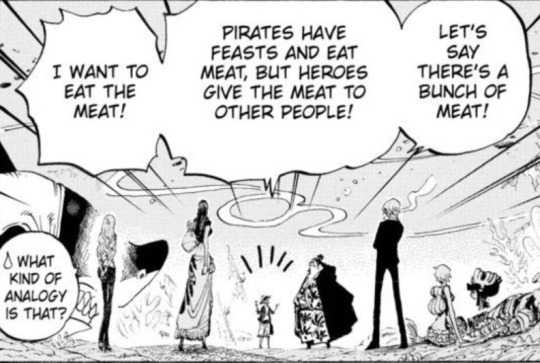
We also learn later on that Luffy also doesn't want to be viewed as a savior, nor does he ever want to present himself as such. He doesn't want to be placed on a pedestal or (ironically) be deified by the people he helps.
At the end of Fishman island, he was fully ready to leave without fanfare because he did not want to be treated by the people in that way, and only agrees to stay because he is promised food. The same thing happens at the end of Wano, where he refuses to take any credit for the downfall of Kaido and instead simply enjoys the festival with everyone else.
I cannot overstate how much I love this decision for Luffy as a character. It is incredibly common for stories like Fishman Island and Wano to have the main character swoop in and save the oppressed people, with said character being to sole person to rally them and "teach" them how to fight back. We don't get that with Luffy.
In Fishman Island, he tells the people that its up to them to decide whether or not he is their friend or foe instead of swooping in playing the role of the hero. In Wano, he understands to importance of who begins the fight with Kaido, and stands back to let the Red Scabbards (Wano natives) get the first major hit on Kaido

Even in the prison when Luffy gives his speech, he is asking the people to let him help, to have faith that they and their country can be free again, to fight for the freedom that had been cruelly stripped away from them. And even then, it is Momo and members of the Red Scabbards that fully restore the Udon prisoners faith.
Hell, we even see this all the way back in Arlong Park, where Luffy waits to take action until Nami asks him for help. He doesn't come in guns blazing and save her like some sort of white knight, but instead waits for Nami's go ahead, placing the power in her hand.
It's just such a refreshing way of seeing a protagonist in this type of story be portrayed. To have him understand the importance of the people he fight's side by side with, and not place himself as the fixer of all problems, but rather as an aid to these people (often times an aid that they explicitly asked for). It actively rejects the white savior/white knight trope(s) and allows for the people native to the island to have agency in these large battles instead of being sidelined. It is their lives and stories that are centered as being the most important in these moments, and Luffy is simply there to help them.
#one piece#one piece meta#one piece spoilers#wano arc#wano spoilers#fishman island#fishman island spoilers#monkey d luffy#character analysis
1K notes
·
View notes
Text
"Seven federal agencies are partnering to implement President Biden’s American Climate Corps, announcing this week they would work together to recruit 20,000 young Americans and fulfill the administration's vision for the new program.
The goals spelled out in the memorandum of understanding include comprehensively tackling climate change, creating partnerships throughout various levels of government and the private sector, building a diverse corps and serving all American communities.
The agencies—which included the departments of Commerce, Interior, Agriculture, Labor and Energy, as well the Environmental Protection Agency and AmeriCorps—also vowed to ensure a “range of compensation and benefits” that open the positions up to a wider array of individuals and to create pathways to “high-quality employment.”
Leaders from each of the seven agencies will form an executive committee for the Climate Corps, which Biden established in September, that will coordinate efforts with an accompanying working group. They will create the standards for ACC programs, set compensation guidelines and minimum terms of service, develop recruitment strategies, launch a centralized website and establish performance goals and objectives. The ACC groups will, beginning in January, hold listening sessions with potential applicants, labor unions, state and local governments, educational institutions and other stakeholders.
The working group will also review all federal statutes and hiring authorities to remove any barriers to onboarding for the corps and standardize the practices across all participating agencies. Benefits for corps members will include housing, transportation, health care, child care, educational credit, scholarships and student loan forgiveness, stipends and non-financial services.
As part of the goal of the ACC, agencies will develop the corps so they can transition to “high-quality, family-sustaining careers with mobility potential” in the federal or other sectors. AmeriCorps CEO Michael Smith said the initiative would prepare young people for “good-paying union jobs.”
Within three weeks of rolling out the ACC, EPA said more than 40,000 people—mostly in the 18-35 age range—expressed interest in joining the corps. The administration set an ambitious goal for getting the program underway, aiming to establish the corps’ first cohort in the summer of 2024.
The corps members will work in roles related to ecosystem restoration and conservation, reforestation, waterway protection, recycling, energy conservation, clean energy deployment, disaster preparedness and recovery, fire resilience, resilient recreation infrastructure, research and outreach. The administration will look to ensure 40% of the climate-related investments flow to disadvantaged communities as part of its Justice40 initiative.
EPA Administrator Michael Regan said the MOU would allow the ACC to “work across the federal family” to push public projects focused on environmental justice and clean energy.
“The Climate Corps represents a significant step forward in engaging and nurturing young leaders who are passionate about climate action, furthering our journey towards a sustainable and equitable future,” Regan said.
The ACC’s executive committee will hold its first meeting within the next 30 days. It will draw support from a new climate hub within AmeriCorps, as well as any staffing the agency heads designate."
-via Government Executive, December 20, 2023
-
This news comes with your regularly scheduled reminder that WE GOT THE AMERICAN CLIMATE CORPS ESTABLISHED LAST YEAR and basically no one know about/remembers it!!! Also if you want more info about the Climate Corps, inc. how to join, you can sign up to get updates here.
#climate corps#american climate corps#acc#biden#biden administration#americorps#epa#environmental protection agency#sustainability#conservation#climate action#climate change#climate crisis#climate emergency#environmentalism#global warming#united states#us politics#hopeposting#hope posting#national forest#public lands#disaster prevention#environment#ecosystem restoration#waterways#recycling#clean energy#reforestation#disaster preparedness
973 notes
·
View notes
Text
The Best News of Last Week - 29 April 2024
1. Net neutrality rules restored by US agency
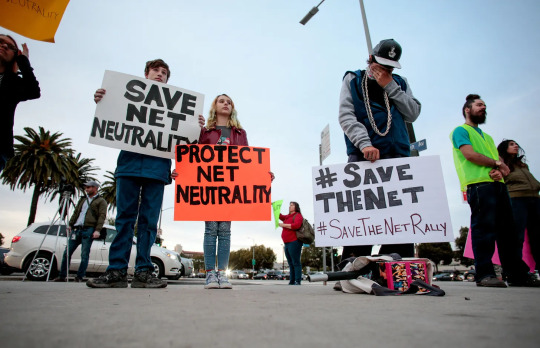
The U.S. Federal Communications Commission voted 3-2 on Thursday to reinstate landmark net neutrality rules and reassume regulatory oversight of broadband internet rescinded under former President Donald Trump.
2. Airlines required to refund passengers for canceled, delayed flights

DOT will also require airlines to give cash refunds if your bags are lost and not delivered within 12 hours.
The refunds must be issued within seven days, according to the new DOT rules, and must be in cash unless the passenger chooses another form of compensation. Airlines can no longer issue refunds in forms of vouchers or credits when consumers are entitled to receive cash.
3. How new mosquito nets averted 13 million malaria cases

Compared to standard nets, the introduction of 56 million state-of-the-art mosquito nets in 17 countries across sub-Saharan Africa averted an estimated 13 million malaria cases and 24,600 deaths. The New Nets Project, an initiative funded by Unitaid and the Global Fund and led by the Innovative Vector Control Consortium (IVCC), piloted the use of dual-insecticide nets in malaria-endemic countries between 2019 and 2022 to address the growing threat of insecticide resistance.
4. Germany has installed over 400,000 ‘solar balconies’

This new wave of solar producers aren’t just getting cheap electricity, they’re also participating in the energy transition.
More than 400,000 plug-in solar systems have been installed in Germany, most of them taking up a seamless spot on people’s balconies.
5. Voyager-1 sends readable data again from deep space

The US space agency says its Voyager-1 probe is once again sending usable information back to Earth after months of spouting gibberish.
The 46-year-old Nasa spacecraft is humanity's most distant object.
6. Missing cat found after 5 years makes 2,000-km journey home

Five years after it ran out the door, a lost cat was returned to a couple in Nevada after it was found thousands of kilometres away. The couple are praising the cat’s microchip for helping reunite them.
7. Restoring sight is possible now with optogenetics
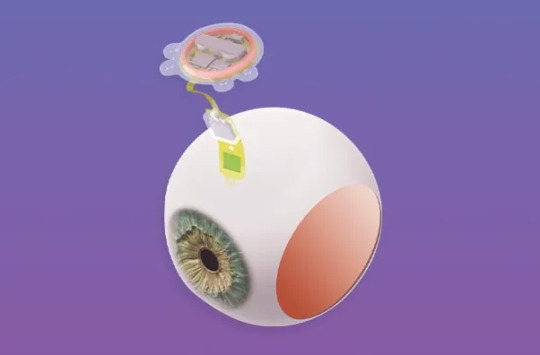
Max Hodak's startup, Science, is developing gene therapy solutions to restore vision for individuals with macular degeneration and similar conditions. The Science Eye utilizes optogenetics, injecting opsins into the eye to enhance light sensitivity in retinal cells.
Clinical trials and advancements in optogenetics are showing promising results, with the potential to significantly improve vision for those affected by retinal diseases.
---
That's it for this week :)
This newsletter will always be free. If you liked this post you can support me with a small kofi donation here:
Buy me a coffee ❤️
Also don’t forget to reblog this post with your friends.
653 notes
·
View notes
Text
"Bo-Katan isn't mean" Okay because I'm so tired of hearing this:
[/mēn/] adjective: unkind, spiteful, or unfair. vicious or aggressive in behaviour. Not mean? Okay definitely not vicious or aggressive in behavior Like her first appearance where she's part of Death Watch, a terrorist group and slaps Ahsoka's ass without consent to demean her?

Or when she shoves Ahsoka to the ground and *laughs* in a tent where Death Watch (including Bo-Katan) has stolen women from the local village on Carlac and put them into forced servitude?

OR when she helps slaughter the village and burn down said village for asking Death Watch to leave them alone? (that's her on top of the roof)?

Or after when she tried to kill Ahsoka and Lux for trying to help the villagers and leave?

Or when she aided in a plot to cause intentional destruction and fear to manipulate the people of Mandalore into deposing her own sister and overturn Satine's very successful government that ended the clan wars (the Traditionalists then were given the lush moon of Concordia and their own political agency and government in which Pre Vizsla was the governor)? Then forcefully deposed Satine at gunpoint after she had abdicated because of the will of the people who no longer accepted her rule due to the manipulation of public perception by Death Watch.


While Bo-Katan was likely traumatized by the Mandalorian Civil War/Clan Wars at a young age and there's no solid canon evidence but It's widely believed by fans that Bo-Katan was groomed and/or radicalized by Pre into DW from a young age--even if you believe this, IT DOES NOT EXCUSE HER HORRIFIC ACTIONS. None of it justifies her wrongdoing. She still had agency.
Okay so what about unkind or unfair?
Surely that can't apply to her sarcastic comment to Ahsoka when approaching her after she had watched her struggle on Kessel and made no move to assister her, only watching her to use her to fight back against Maul and reclaim Mandalore. While she does respect and befriend Ahsoka by the end of the Siege, she still initially saw her as someone to be used for her agenda.

Or when she uses Obi-Wan's guilt over his relationship with Satine to convince him to aid her forces in retaking Mandalore, which Republic intervention would disintegrate treaties over a hundred years old and start another war on top of the ongoing Clone Wars. Which to her was a legitimate, even desperate method to reclaim her planet from Maul who was only serving his own agenda, but it wasn't a very nice way to do it. In some ways Bo-Katan is justified in how she is mean, but it doesn't make her not mean.

Then there's her anger towards Sabine after she discovering what the Duchess does and that Sabine created it (after hearing how guilt ridden she is and how she already destroyed it.) Was her anger valid, oh yeah. Was it kind and and fair? No.

What about in The Mandalorian you ask? She's not a literal terrorist anymore in the Mandalorian. She's surely not still spiteful or unkind. Definitely not when she insulted Din's religious beliefs and way of life and called the COTW a cult.
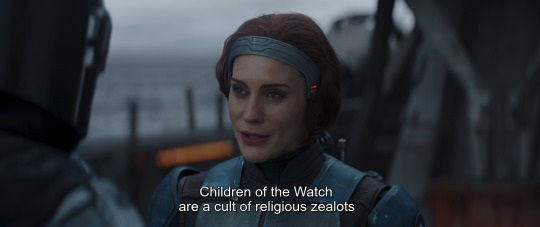
Or when she took credit for killing that one guy's brother without any remorse.
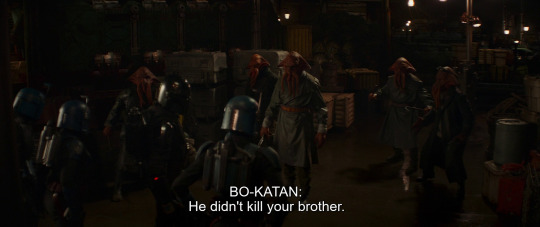

Or when she changed the terms of her agreement with Din and forced him into helping her by withholding the agreed upon information after Din upheld his side of the deal. Which was her plan all along. And then on top of that, mocks him by using his own mantra.
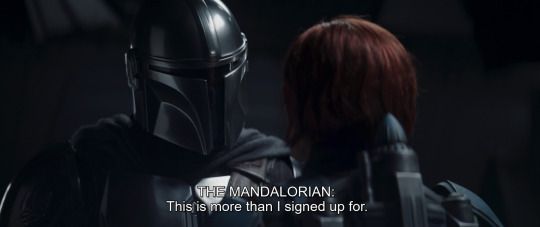




And then there's the disdainful opinion she has of Din and her own superiority.
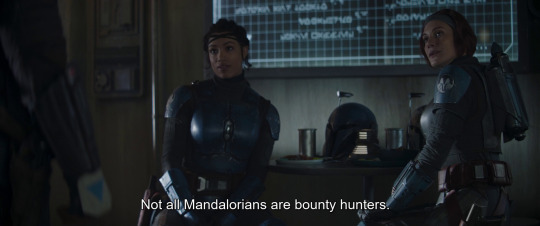
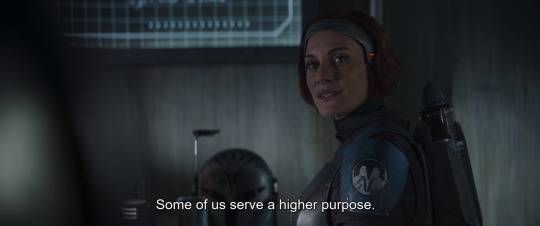
Only agreeing to help Din save his kid when he has something to offer her to serve her own agenda. Which again, valid but not something she does out of the kindness of her heart.



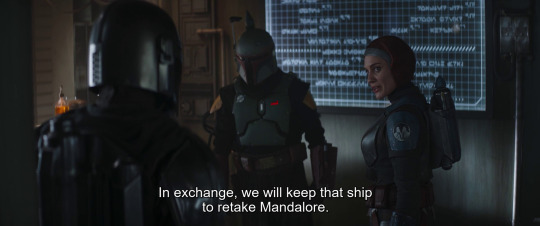
Oh and then she's so direct and straightforward to Boba, not mean at all.
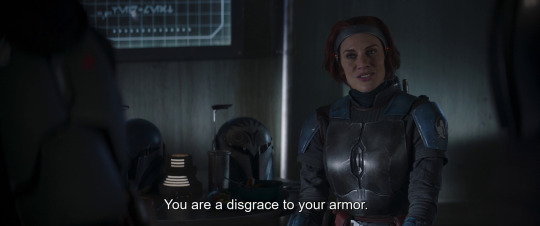


Then in season 3 when Din shows up to help her reclaim Mandalore the first thing she does is take out her anger on him and once again insult his religion/COTW and invalidate his belief that the Mines will restore his place in his religion. All unnecessary.
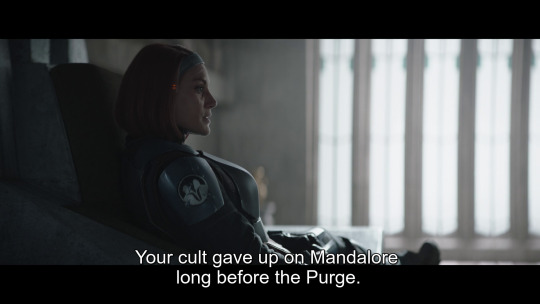



TO BE EXTREMELY CLEAR: I'm not discrediting Bo-Katan's personal progress into a better person or when she does do good--a hero even by the end of Mando season 3--that's the whole point of a redemption arc, you have to be redeemed from something. And at her core is a commitment to Mandalore, but you can't ignore the cruelty and ego and dare I say it meanness that has gone with it, that's the beauty of her complexity is that she can be a character that grows and evolves and becomes honorable and also still be bitchy. Bo-Katan doesn't have to be morally squeaky clean or a victim to enjoy her character and her sometimes ruthless determination for Mandalore or appreciate her compassionate aspects and letting go of her ego. She's not an easily consumable or morally black and white character. This is in fact, what I love about her.
Thank you @armoralor for assistance with the screenshots from The Mandalorian!
#If you think Bo-Katan is “not mean” after this man I don't know what to say media literacy is at a historic low#i'm so tired of people saying she's this uwu soft victim Bo-Katan like who the fuck is that woman#SHE WAS A LITERAL TERRORIST#she has experienced horrors but she has also committed them#bo-katan kryze#bo katan kryze#tcw#the clone wars#the mandalorian#din djarin#sabine wren#pre vizsla#satine kryze#star wars#this is my magnum opus
432 notes
·
View notes
Text
I think I've figured out one thing (beyond that .... "ending" ....) that bothers me about TUA s4 and Klaus.
It seems like the popular dichotomy, in terms of his characterization, is "fearful of life because he's mortal" versus "careless and effectively invicible" and that somehow being divested of his abilities would pave the way to healing and guarantee sobriety. Klaus's rage at his family for saving his life by returning his powers is proof enough that HE believes this. Alongside this is the presumption that all of his character development last season, mastering the gift of immortality, is itself--RATHER THAN THE WAY THAT HE MASTERED IT (by being led on and used by Reginald, and made to equate his worth with his usefulness/skill)--should be nixed. It's bad for him to be porous to the veil between life and death. It's bad for him to be immortal. He can't "deal with it" and he'll go on a bender the moment it's restored. His unwillingness to drink the "marigolds" (until he's dying and forced to do so) is supposed to be proof of this.
I have some qualms with this line of thinking, despite its solid attempt at showing character development.
I think Klaus is braver than people give him credit for WHILE he is mortal. Friends have posited (and I agree with this part) that he becomes very high strung and phobic about any form of injury or illness because even though mortality is scary to someone who just found out he was immortal...and then lost that immortality...he also feels he has CONTROL over his own body and mind and life that he was NOT afforded when he could be possessed by ghosts and used for his conjuring powers (both by family and predators). And I've been harping on Klaus's need to actually have agency and grant consent since that squicky Ben-possession joke in season 2. But, agh.
To begin with, I don't think Klaus is 'afraid' of life (or at least that the fear is unwarranted or laughable) so much as he's forcing himself to endure what he KNOWS is deeply perilous and unfortunate t unlucky people like himself, without resorting to the powers that also open the door to substance abuse. Of all of the Brellies, he tries the hardest, the most often, to break patterns, when he sees that there is motivation to do so (more on this later). He is hardcore and brave as fuck, rubber gloves or not.
But is it really a good thing, or even necessary for Klaus as a character, to equate no powers with guaranteed sobriety and powers with falling off the wagon? I don't think it is.
Unfortunately, this is hard to glean from the audience pov, because all we're given in this season is the most extreme, toxic, abusive, stomach-turning example of how his powers can be abused the moment they return--and how, of course, this exacerbates relapse. We get the whole 'have sex with his body while the deceased possess it, for drug money" subplot. We get him getting so desperate for the cycle to end that he begins inviting harm and self-harming out of some grim hope that his powers will fail (getting shot in the head scene). And he needs the drugs that this awful situation provides BECAUSE OF said situation. Compound upon that the PAST trauma that it's opening back up like a raw wound (literally, from at least the age of 8). Of course Klaus is using because of his powers, but because THEY'RE BEING ABUSED.
Klaus's abilities don't guarantee a fall off the wagon. His low self-esteem does, and the inability of anyone in his life to communicate with him or intervene does. When (deleted but still important scene) Lila's relatives are calling him, in front of him, a loser junkie (etc), and he says, "Yeah, that's....that'd be me," Klaus is mortal. We see the cogs in his head turning: yeah, I'm worthless, what's the point. And it's already too late right there, unless someone intervenes.
"What's the point," AND NOTHING ELSE, is Klaus's kryptonite. And he isn't a fatalist by nature, I'll (controversially, I guess) add, but there are things nobody can endure forever. Klaus, like any addict, is there because of underlying core beliefs about himself and about his ability to change his circumstances. What I love about the deleted scene that shows Klaus INSISTING on having his AA meeting is that he becomes his own advocate, because well, the Hargreeves are "all assholes" (well spotted, Klaus, lol) in their own ways, and each has to be their OWN intervention. This has more to do with self-determination than it does with seeing ghosts. The cause and the remission of Klaus's addiction is deeper-seated than powers that are given and taken away at surface level.
Why is this so important to me? I guess because to me the powers Klaus never asked for still remind me of something perhaps not initially intrinsic to someone's being--but still something they have to integrate into their lives in order to go on living. I think it MEANS more to fans who identify with Klaus (at least it does to me, someone with debilitating chronic illness) that he be able to transform his abilities into a strength that is, to Klaus and his loved ones, benign, while also not letting it become the central facet of his identity. He IS a medium, but he is also OTHER things. He is a human being, and all human beings have many interests, roles, and hopes.
The precipiating events of Klaus's trauma are NOT his ability to see ghosts or resuscitate. They're the abuse inflicted by those who would use Klaus for their own gain. Why should he give up his powers in order to heal, just because Reginald is an unconscionable monster who was willing to kill his own child over and over and over? I wish Klaus himself had had this epiphany before the show ended.
Losing his powers for good would certainly be the quickest route to healing and growth, and fine, if fans like it, go for it. To me, though, it feels like "don't ever wear crop tops because if you do, you won't get SA'd." Like, no. Maybe the world needs to operate by a kinder standard. Maybe Klaus needs a real support group, a better family of his own, to help him contradict his feelings of self-loathing. Maybe he needs the AA counselor to stay when he shows up for his chip. Maybe he needs reliable transportation to and from. Maybe he needs to move to a different city. Maybe he needs to chat with some of the ghosts he sees, and start a fucking Tuesday evening afterlife meditation circle. Maybe he can get a cheap apartment and fill his living space with succulents that he has to be held accountable to feed and water and keep ALIVE. Maybe he should become an AA counselor and help other people go the right direction. Maybe he should resort to poetry or knitting every time he has an urge to use, and that can become a healthier compulsion. Maybe someday he can get a kitten or start dating again (someone alive, in this century). What Klaus needs is to have MORE in his life to define him than his powers and how they can be used for the benefit of others.
Maybe the TUA writing staff is weirdly sadistic and won't let any of that happen. But by God, we can. And it's important. It's important that healing and remission not be dependant on things others can bestow or take away (like powers). It needs to depend on something internal, an "internal locus of control," as the CBT shrinks call it. THAT is having control over your own life.
43 notes
·
View notes
Text

In today’s financial landscape, having a healthy credit score is more important than ever. Whether you’re looking to buy a home, secure a loan, or get a credit card, your credit score can significantly impact your financial opportunities. Unfortunately, life can sometimes throw curveballs that negatively affect our credit. This is where Credit Restoration Services come into play, offering a lifeline to individuals looking to recover and improve their financial standing. In this blog post, we’ll explore how Credit Restoration Services can help pave the way to financial recovery and stability.
#credit restoration#credit score#credit card#credit restoration services#credit report#credit restoration company#bad credit#improve credit score#credit restoration agency#how to improve your credit score
0 notes
Text

L.A.fires Mary Elaine LeBey
* * * *
LETTERS FROM AN AMERICAN
January 8, 2024
Heather Cox Richardson
Jan 09, 2025
At least four wildfires tearing across Los Angeles have killed at least five people and forced the evacuation of at least 130,000 more, and have flattened about 42 square miles (109 square kilometers). The fires are being driven by unusually high winds with gusts of up to 98 miles per hour (158 km per hour). Although January is typically part of California’s wet season, conditions are terribly dry. Downtown Los Angeles has received just 0.16 inches (0.4 cm) of rain since May 6, 2024, and the summer was unusually hot.
President Joe Biden is supporting state and local responses to the fire with federal resources. Today, he approved a major disaster declaration, which enables people and towns to access funds immediately in order to jump-start their recovery. The Federal Emergency Management Agency (FEMA) will reimburse California for some of the costs of fighting the fires. Five U.S. Forest Service large air tankers and ten federal firefighting helicopters have been deployed to support the local firefighters; ten Navy helicopters with water delivery buckets are joining them. California governor Gavin Newsom has deployed the California National Guard, and the Nevada National Guard is standing by.
Canada, too, has sent water-dropping helicopters and a pair of planes, which are part of a firefighting contract with California that’s been in place for 14 years.
At a fire station in Santa Monica, Biden stood beside Newsom and said: “We’re prepared to do anything and everything for as long as it takes to contain these fires.”
In contrast to federal support for California under Biden, in the midst of the ongoing crisis President-elect Donald Trump blamed California governor Gavin “Newscum and his Los Angeles crew” for the fires, suggesting he had put the needs of fish over the people of California. He posted: “Governor Gavin Newscum refused to sign the water restoration declaration put before him that would have allowed millions of gallons of water, from excess rain and snow melt from the North, to flow daily into many parts of California, including the areas that are currently burning in a virtually apocalyptic way.” "Let this stand as a symbol of the gross incompetence and mismanagement of the Biden/Newsom duo,” Trump posted. “January 20th cannot come fast enough!"
Newsom’s office responded: “There is no such document as the water restoration declaration—that is pure fiction. The Governor is focused on protecting people, not playing politics, and making sure firefighters have all the resources they need.”
Trump is apparently claiming that water that could be used to fight the fires has been diverted to protect the endangered Delta smelt. But the water systems in California are complicated, and importing water from northern California would make no difference for the wildfires.
Los Angeles water doesn’t come from northern California. It comes from an aqueduct east of the Sierra Nevada, from groundwater, and from the Colorado River. Right now, the Metropolitan Water District of Southern California has more water stored than it has ever had before, according to Mark Gold, a board member. “It’s not a matter of having enough water coming from Northern California to put out a fire,” he told Alastair Bland of CalMatters. “It’s about the continued devastating impacts of a changing climate.”
Hydroclimatologist Peter Gleick told Taryn Luna, Liam Dillon, and Alex Wigglesworth of the Los Angeles Times that Trump’s linking of water policy to the raging fires was “blatantly false, irresponsible and politically self-serving.”
The two different responses of the current president and the incoming one reveal dramatically different approaches to the presidency.
Yesterday the Biden administration announced the finalization of a new rule that will remove medical debt from all credit reports. Until now, medical debt has meant that consumers could be denied mortgages, car loans, or small business loans. In addition, Vice President Kamala Harris announced that funds from the American Rescue Plan, passed by Democrats shortly after Biden took office in 2021, have enabled the elimination of more than $1 billion in medical debt for 700,000 Americans. Jurisdictions are on track to eliminate about $15 billion in medical debt for nearly 6 million Americans, the White House said.
“No one should be denied economic opportunity because they got sick or experienced a medical emergency,” Harris said.
While Biden and Harris are working to solve problems for regular Americans, Trump has simply gone on the offensive, attacking Democrats for what he claims is their mismanagement without offering any ideas of his own. “NO WATER IN THE FIRE HYDRANTS, NO MONEY IN FEMA,” he posted. “THIS IS WHAT JOE BIDEN IS LEAVING ME. THANKS JOE!”
By now, we know that Trump goes on offense to hide his own shortcomings. As Judd Legum of Public Notice pointed out, “The largest wildfire in California history—the August Complex Fire, which burned more than 1 million acres—occurred during the Trump administration.”
That pattern of going on offense to hide his own behavior was also on display today when CNN’s Hadas Gold reported that someone inside the Fox News Channel (FNC) gave the Trump team the questions that Trump would be asked at an Iowa town hall last January just before the Iowa caucus. A forthcoming book by Alex Isenstadt of Politico details the close relationship between Trump and people within FNC. It says that after Trump refused to prepare for that town hall, someone inside Fox texted the questions to a senior Trump aide, enabling them to prep him with answers.
After Trump fell apart during his debate with Vice President Harris, he accused her of knowing the questions ahead of time and said the debate was “rigged.”
Trump apparently went on the offensive yesterday when he called Supreme Court Justice Samuel Alito just hours before Trump’s lawyers filed an emergency request with the court asking it to stop Manhattan judge Juan Merchan from sentencing Trump Friday in the election interference case in which a jury found him guilty of 34 felonies. Alito told reporters that they talked only about a job opportunity for one of Alito’s law clerks and did not discuss the case, but it is highly unusual for a president or president-elect to talk with a Supreme Court justice when that official has business before the court. CNN’s Kaitlan Collins said such a thing was “almost unheard of.”
As legal analyst Quinta Jurecic observed, though, someone leaked news of this inappropriate contact astonishingly quickly. Such news usually “has taken a while to dribble out,” Jurecic noted, but “this happened THIS MORNING. [S]omebody was smug or pissed off enough to go to the press right away.”
Trump’s accusations that Biden committed a crime more likely to be chalked up to Trump himself—taking bribes from a foreign company—was also in the news today. Alexander Smirnov, the key witness for the House Republicans’ investigation into Biden, was sentenced to six years in prison after pleading guilty to lying to the FBI about the alleged bribery and to tax evasion.
Julia Ainsley and Carol E. Lee of NBC News today reported another way in which Trump is threatening to go on offense: by conducting a very visible raid targeting undocumented immigrants in the Washington, D.C., area as soon as he takes office. While Presidents Barack Obama and Biden have targeted employers who violate labor laws, Trump wants to demonstrate “shock and awe” by raiding workplaces and sweeping up migrants who are in the U.S. without documentation, regardless of their criminal status. His transition team has been talking with U.S. Immigration and Customs Enforcement (ICE) officials about the logistics of such raids.
And then, of course, there are Trump’s frequent references to taking over other countries. Don Jr. traveled to Greenland this week with right-wing activist and media personality Charlie Kirk, ostensibly to record a podcast, but Trump Sr. followed the trip with posts saying “MAKE GREENLAND GREAT AGAIN!” That idea is getting traction among MAGA leaders, even though—or perhaps because—it is a direct affront to the North Atlantic Treaty Organization (NATO), to which both the U.S. and Denmark belong.
Over the New York Post’s map of the “Donroe Doctrine” in which Canada is labeled “51st state,” Greenland is labeled “our land,” the Gulf of Mexico is labeled “Gulf of America,” and the Panama Canal is labeled “Pana-Maga Canal,” the Republican majority on the House Foreign Affairs Committee posted today: “Our country was built by warriors and explorers. We tamed the West, won two World Wars, and were the first to plant our flag on the moon. President Trump has the biggest dreams for America and it’s un-American to be afraid of big dreams.” Journalist Jamie Dupree screenshotted the tweet before the committee deleted it.
Behind all the offense, though, things that matter deeply to the American people are going largely unnoticed.
MAGA representatives have been introducing a slew of measures to the new Congress, many of which incorporate the plans of Project 2025 into legislation. They call for turning over immigration to the states, privatizing veterans’ healthcare, and repealing the 1993 National Voting Rights Act, the 2010 Affordable Care Act, and the 2022 Inflation Reduction Act.
Bills call for withdrawing the U.S. from the World Health Organization; increasing oil and gas production on federal lands; abolishing the Internal Revenue Service (IRS), the Bureau of Alcohol, Tobacco, Firearms, and Explosives (ATF), and the Occupational Safety and Health Administration (OSHA); allowing states to spend federal education money on private school vouchers; and removing the protection of transgender rights from schools.
Other measures would revoke security clearances for “certain former members of the intelligence community,” introduce a constitutional amendment to cap the Supreme Court at nine justices, and cut off federal funding to the Manhattan District Attorney’s Office (the office that successfully charged Trump with election interference) and the Fulton County (GA) District Attorney’s Office (the office that has charged Trump with criminal conspiracy).
And MAGA Republicans have proposed a bill to impose a national abortion ban, along with a bill urging Congress to support a consortium of antiabortion doctors for women because, the bill says, “health care should emphasize the whole woman, including her physical, mental, and spiritual wellness,” and “health care for women should also address the needs of men, families, and communities.”
LETTERS FROM AN AMERICAN
HEATHER COX RICHARDSON
#L.A.fires#Heather Cox Richardson#Letters From An American#MAGA Republicans#regressive legislation#climate emergency#Corrupt SCOTUS#Alito#FEMA#Canada
15 notes
·
View notes
Text

The Impact of Credit Report Repair Services on Your Finances
Credit repair is the service of restoring or correcting a poor credit score. They help individuals improve their credit scores by identifying and disputing inaccurate or outdated information on their credit reports. The Credit Specialists provide the best credit report repair services in Texas. If you are struggling with a bad credit score then don't worry we help you improve it and maximize your finances. For more details visit the official website of The Credit Specialists.
#free credit consultation texas#credit repair in texas#Credit report restoration#credit repair agency texas#The Credit Specialists
0 notes
Text
Samantha Riedel at Them:
The National Park Service (NPS) removed the word “transgender” from its web page about the Stonewall National Monument this week, and removed the letter “T” from instances of the LGBTQ+ acronym, Them has confirmed. As recently as February 12, the NPS page for the Stonewall National Monument — commemorating the 1969 Stonewall Uprising in New York City, often credited as the catalyst for the U.S. gay liberation movement — informed readers that the riots were a “milestone in the quest for LGBTQ+ civil rights,” and spelled out what each letter stands for, according to archived versions of the page. But on February 13, the page was edited, referring only to the “LGBQ+” movement with no mention of the word “transgender.” Later that same day, the acronym was changed again to remove the “Q+,’ so that it now only reads “LGB.” (The Stonewall Visitors’ Center website, which is operated by the nonprofit organization Pride Inc., was not affected.)
In a statement to Them, representatives for The Stonewall Inn and the Stonewall Inn Gives Back Initiative — the Inn’s official nonprofit organization — said they were “outraged and appalled” by the changes to the National Monument page. The erasure, they said, “not only distorts the truth of our history, but it also dishonors the immense contributions of transgender individuals — especially transgender women of color — who were at the forefront of the Stonewall Riots and the broader fight for LGBTQ+ rights.” “This decision to erase the word ‘transgender’ is a deliberate attempt to erase our history and marginalize the very people who paved the way for many victories we have achieved as a community,” they added, demanding the “immediate restoration” of the page as previously written. “It is a direct attack on transgender people, especially transgender women of color, who continue to face violence, discrimination, and erasure at every turn.”
This purge of the word “transgender” and the letter T — made almost comedically cruel by the central roles trans and gender-nonconforming people played during the uprising — is almost certainly tied to President Donald Trump’s recent slate of anti-trans executive orders, through which he has sought to outlaw any mention of trans people, identities, or history at the federal level.
Following Trump’s first such order, the Office of Personnel Management (OPM) issued a directive for all federal agencies to remove usage of terms like “trans” and “gender identity,” and instructed workers to remove pronouns from their email signatures. Web pages belonging to the State Department and Centers for Disease Control and Prevention (CDC) were also scrubbed of the word “transgender” earlier this month, with the LGBTQ+ acronym replaced with the shortened “LGB” — a construction usually associated with trans-exclusionary groups like the U.K.-based “LGB Alliance” and far-right organizations that have sought to use anti-trans propaganda to splinter the LGBTQ+ community at large.
Shame on you, National Park Service, for removing “transgender” from the website of Stonewall National Monument and for dropping the “TQ+” part of LGBTQ+!
This is an unjust act of history revisionism as part of the Trump Regime’s war on trans existence, considering that trans people played a major role in the Stonewall Riots.
See Also:
The Guardian: US park service erases references to trans people from Stonewall Inn website
#National Park Service#Transgender Erasure#Transgender#Anti Trans Extremism#LGBTQ+#LGBTQ+ History#Stonewall Riots#Stonewall National Monument#Stonewall Inn#History Revisionism
6 notes
·
View notes
Text
Things Biden and the Democrats did, this week.
January 19-26 2024
The Energy Department announced its pausing all new liquefied natural gas export facilities. This puts a pause on export terminal in Louisiana which would have been the nation's largest to date. The Department will use the pause to study the climate impact of LNG exports. Environmentalists cheer this as a major win they have long pushed for.
The Transportation Department announced 5 billion dollars for new infrastructure projects. The big ticket item is 1 billion dollars to replace the 60 year old Blatnik Bridge between Superior, Wisconsin, and Duluth, Minnesota which has been dangerous failing since 2017. Other projects include $600 million to replace the 1-5 bridge between Vancouver, Washington, and Portland, Oregon, $427 million for the first offshore wind terminal on the West Coast, $372 million to replace the 90 year old Sagamore Bridge that connects Cape Cod to the mainland,$300 million for the Port of New Orleans, and $142 million to fix the I-376 corridor in Pittsburgh.
the White House Task Force on Reproductive Healthcare Access announced new guidance that requires insurance companies must cover contraceptive medications under the Affordable Care Act. The Biden Administration also took actions to make sure contraceptive medications would be covered under Medicare, Medicaid, CHIP, and Federal Employee Health Benefits Program. HHS has launched a program to educate all patients about their rights to emergency abortion medical care under the Emergency Medical Treatment and Labor Act. This week marks 1 year since President Biden signed a Presidential Memorandum seeking to protect medication abortion and all federal agencies have reported on progress implementing it.
A deal between Democrats and Republicans to restore the expand the Child Tax Credit cleared its first step in Congress by being voted out of the House Ways and Means Committee. The Child Tax Credit would affect 16 million kids in the first year and lift 400,000 out of poverty. The Deal also includes an expansion of the Low-Income Housing Tax Credit which will lead to 200,000 new low income rental units being built, and also tax relief to people affected by natural disasters
The Senate Foreign Relations Committee voted for a bill to allow President Biden to seize $5 billion in Russian central bank assets. Biden froze the assets at the beginning of Russia's war against Ukraine, but under this new bill could distribute these funds to Ukraine, Republican Rand Paul was the only vote against.
The Senate passed the "Train More Nurses Act" seeking to address the critical national shortage of nurses. It aims to increase pathways for LPNs to become RNs as well as a review of all nursing programs nationally to see where improvements can be made
3 more Biden Judges were confirmed, bring the total number of Judges appointed by President Biden to 171. For the first time in history the majority of federal judge nominees have not been white men. Biden has also appointed Public Defenders and civil rights attorneys breaking the model of corporate lawyers usually appointed to life time federal judgeships
#good news#thanks Biden#Joe Biden#Democrats#politics#us politics#climate change#abortion#reproductive rights#child tax credit#judges
612 notes
·
View notes
Text
youtube
“Litter raking” was once common in many mountain and upland areas where alternative sources of bedding, such as straw, were scarce. This material was used as bedding for livestock in winter, and beech leaves were even used in the Alps to fill mattresses for human use. With the advent of alternative sources, this practice has largely been abandoned. However, the use of litter raking now appears to be very suitable for restoration and maintenance management to conserve the biodiversity of open forests.
Credits:
Manuscript: Norwegian Institute of Bioeconomy Research, Institute of Botany of the Czech Academy of Sciences, Czech University of Life Sciences Prague, Pamadillo
Animation: Pamadillo - https://www.pamadillo....
Intro/ending music: Gregor Quendel https://www.gregorquen...
Middle music: Andreas Raad / @baltimus9000
Project: ROTATE: Application of traditional knowledge to halt biodiversity loss in woodlands
Funding: Technology Agency of the Czech Republic and Norway Grants 2014–2021
Contact: NIBIO researcher Fride Høistad Schei, [email protected]
References:
1. - (0:25) Cutout: Women gather needles and herbs https://www.waldwissen...
2. - (0:54) Historic photograph: Litter collecting day in Betlis https://www.researchga...
3. - (0:56) Historic photograph: Extraction of beech leaves https://www.waldwissen...
4. - (0:58) Historic photograph: Litter collecting day in Betlis https://www.researchga...
5. - (01:00) Cutout: Woman and boy with filled leaf baskets https://www.waldwissen...
6. - (1:02) Cutout: Lady https://www.life.com/h...
7. - (1:03) Cutout: Sheep https://cartorum.fr/ca...
8. - (01:10) Cutout: Horse and carriage https://www.alamy.com/...
9. - (01:42) Cutout: Lady and leaves / 1774065544066425111
#Norsk institutt for bioøkonomi#solarpunk#europe#forest management#forest restoration#Litter raking#leaves#raking leaves#alps#biodiversity#forest maintenance#Youtube
9 notes
·
View notes